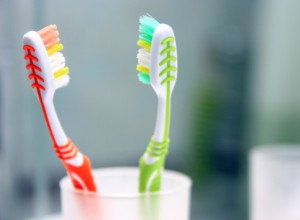How to Reduce your Risk for Tooth Decay
Learn about the key activities for reducing your risk of tooth decay and maintaining healthy teeth.

Strengthen Teeth
Weak teeth is a definite risk factor for tooth decay, because the thinner the layer of enamel and dentin is on the tooth, the easier it will be for decay to develop to the point where it causes sensitivity and possible infection. There are several ways to protect and strengthen teeth to enable them to better resist tooth decay. First, it is important to eat a healthy diet with plenty of calcium, the mineral that forms the building block of healthy tooth enamel. Your body will naturally deliver new calcium to your teeth via your saliva, strengthening them through a process called remineralization. You can support this process by using a fluoride toothpaste, which will result in a stronger enamel layer being formed on your teeth. You may also want to investigate the possibility of sealants to create a strong, decay-resistant surface on your teeth.
Control Oral Bacteria
The main cause of tooth decay is acid produced by oral bacteria in the mouth. These bacteria normally adhere to teeth in a film called plaque. You need to be diligent with your oral hygiene in order to keep plaque bacteria from building up to unhealthy levels that could cause rapid tooth decay. Brush and floss regularly at home, use mouthwash, and don’t forget to get annual dental cleanings at your dentist’s office.
Limit Sugar & Acid Intake
Even with bacteria kept under control with good oral hygiene, your diet could be creating a risk for tooth decay. This can occur in two ways. First, eating acidic foods can contribute to enamel erosion, weakening teeth and making them more susceptible to decay. Secondly, eating sugary foods can provide oral bacteria with the fuel they need to make their own acid, which again would cause tooth decay. If you must eat sugary or acidic foods, be sure to brush your teeth or at least rinse your mouth out afterwards to limit the risk of tooth decay.
Treat Existing Cavities
If your teeth have already been affected by decay, you need to get treatment right away to protect these teeth and prevent further damage to the tooth structure. At California Dental Group, we specialize in placing white composite fillings that can seal up cavities without affecting the beauty of your smile.




